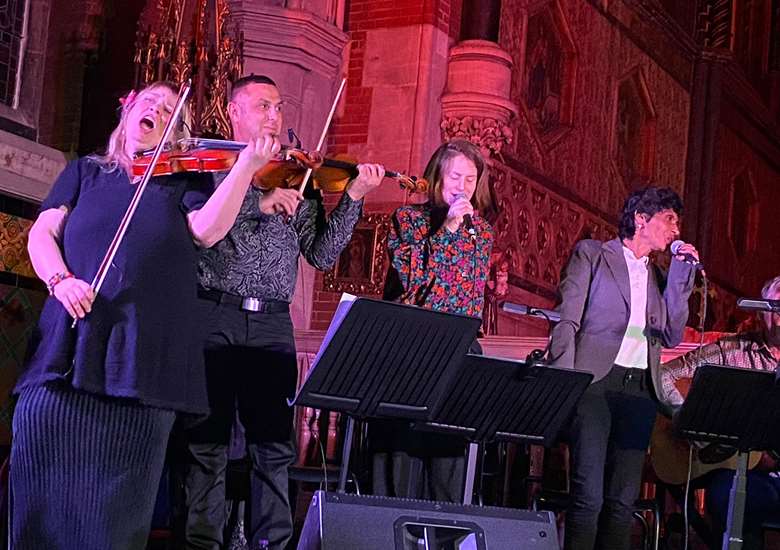Angrusori featuring Nils Henrik Asheim and Iva Bittová grace the Grand Junction at St Mary Magdalene’s Church, Paddington
Ken Hunt
Friday, January 26, 2024
Ken Hunt witnesses the powerful Slovak-Norwegian orchestra Angrusori in full voice in this most spiritual of settings

Before the audience filed in, the nave of the Grade I listed, neo-Gothic church felt cold and intimidating. Bang on time, the ten members of the mixed Slovak-Norwegian orchestra Angrusori, under Nils Henrik Asheim, took the stage with the Moravian virtuosa of simultaneous violin-vocal extemporisation and dynamics, Iva Bittová. Like their Live at Tou, the concert’s backbone was a garland of Romani songs which the Slovak ethnomusicologist and film-maker Jana Belišová collected from her country’s marginalised Roma minority. They cast off with the slow-fuse, Johnnie Walker-sodden tale, ‘Sar me kere džava’ (‘When I was going home’). Petter Frost Fadnes’s baritone sax grumble (masterful circular breathing) led into dissonant splashes resolving into a lament. The first off-piste departures came with the boisterous ‘Paprika melali’ (‘Dirty paprika’) and, with Bittová as solo vocalist, ‘Loli Ruža’ (‘Red Rose’). Norwegian vocalist Signe Irene Time’s solo vehicle, ‘O Verden, hav da gode Nat’ (‘Oh World, have a good night’) added a religious note to the proceedings.

L-R: Marcela Dreveňáková and Iva Bittová – Photo by Ken-Hunt
Andy Bell’s instrument separation and sound was a master-class in acoustics. The auditorium’s dimensions and a band of this size presented real challenges. When rhythmist Ståle Birkeland slipped in musical saw, you heard it before you saw it. Bittová’s jazz vocalese, bird calls, sounds of nature and vocal improvisations coloured the air. They danced the evening to a close with the celebratory ‘O poštaris avel’ (‘The postman is coming’) from Dušan Hanák’s communist-era film Ružové sny (‘Rosy dreams’). A milestone in Czechoslovak cinema, it portrayed a love story between a Roma woman – an early film role for Bittová – and the Gojo (non-Rom) postman of the song title. That film was political in 1977. Like Civil Rights-era jazz in the States, the very existence of this music is political in 2024. An evening of utter intensity.
With thanks to Iva Bittová for additional translations.


